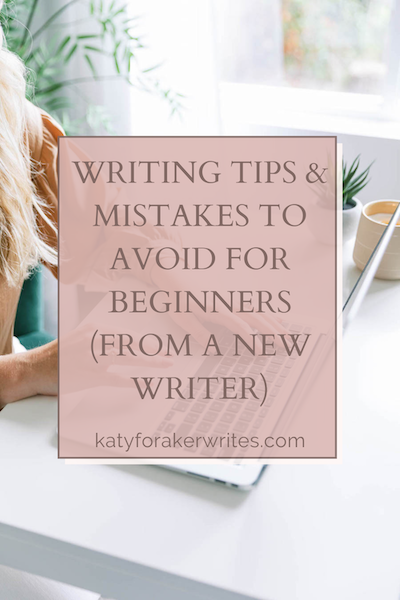I began my writing journey in the professional-ish sense a year and half ago and boy, have I learned SO much from my teenage days of cracking open Word and typing away. There’s even lingo (we’ll get to that) that you’ll need to understand when chatting with other writers/editors. So here’s a short list of the best writing tips for beginners from a writer who still considers a newb.

1. Words Not Pages
One of the first things you’ll realize is that progress is not tracked in pages, but in words. Pages are subjective, but words are always a concrete form of measurement. For example, a 400 page book is about 100,000 words. You’ll start tracking your daily writing word count, and telling others of your manuscript’s progress in the number of words, not chapters or pages.
There are even benchmarks for how long a novel should be by genre:
Non-fiction: 50,000-80,000 words
SciFi/Fantasy: 90,000-125,000 words
Romance: 80,000-100,000 words
2. Read & Write Everyday
So crucial! There’s a 70/20/10 rule that the more you do something, on average, 70% of it will be OK, 20% of it will be good and 10% of it will be amazing. If you apply that to writing, the more you write, the more chances you’ll have more prose in that amazing category.
With reading, I gain so much inspiration from other books, whether it’s wording or how to open and end chapters that help me cultivate my craft in ways that movies and TV can’t. You don’t need to spend hours reading everyday. I try to aim for a chapter or 30 minutes a day.
3. Invest in a Writing Software
Whether it’s Microsoft Word or Scrivener, make sure you have a place to store all of your inspo, beat sheets, brain dumps and manuscripts. I love using Scrivener’s mobile app to jot down inspiration on my beat sheet as it strikes.
Also be sure to sign up for cloud storage that automatically syncs your documents (I use Dropbox’s free plan). You’ll thank me later.
4. It’s OK to Not Have Everything Figured Out From the Start
When I first started writing my novel, it was scary. I had only written fanfiction before where you know the characters and setting inside and out. When I first started creating characters from scratch, they were like strangers. I didn’t know what their full arcs would be initially, or have all their mannerisms worked out.
And you know what? That’s OK.
As I started to write them in scenes, their characterization grew naturally. And after the first draft, I had the perfect place to start reworking their tiny quirks and mannerisms to draw out fully developed characters. A character can’t transform from an idea in your head into something lifelike on the page unless you start writing.
5. The Lingo
Just like speaking in word-counts, here are some more writer slang/acronyms:
MS: Manuscript
MC: Main Character
Betas: Beta readers
Inciting Incident: The event that sets the story on its journey
Hook: First sentence/first paragraph
Querying: When you actively pitch literary agents for representation
SFF: Science Fiction/Fantasy genre
6. Manuscript formatting
Once you finish your novel (whoo-hoo! 🍾), you’ll start sending it to beta readers and maybe and editor (or two, or three, like me). Did you know there’s an industry standard format of how your manuscript should look? It’s not a huge deal when sending to beta readers, but editors will expect you to send your MS in this format. And if you start formatting your MS in this way after the revision step, you’ll look all the more professional and much less writing newb.
Here’s a great video on how to format your manuscript in word, or how to set it up in Scrivener.
7. Think how your prose looks visually
This next one is one of my favorit writing tips for beginners: one of the first big critiques of my writing was that it was visually dense. The prose was good, but lots of chunky paragraphs.
Break it up!
Give sentences their own line to dramatize action or character revelation. Adding more visual whitespace on the page will also make it easier for readers to digest.
8. Writing Can Be Hard, but it Should Always Be Fun
Writing can be challenging. Especially if you can’t figure out exactly how to fix something (a scene, a character arc, etc.), but it should still be fun! And extra rewarding when you solve it. When it stops being fun, close the laptop/journal and take a long walk or workout and see how you feel after. I usually find the solutions to my problems when I do just that.
Do you have any great writing tips that you wished you knew as a beginner writer? Comment them below!

Comments +